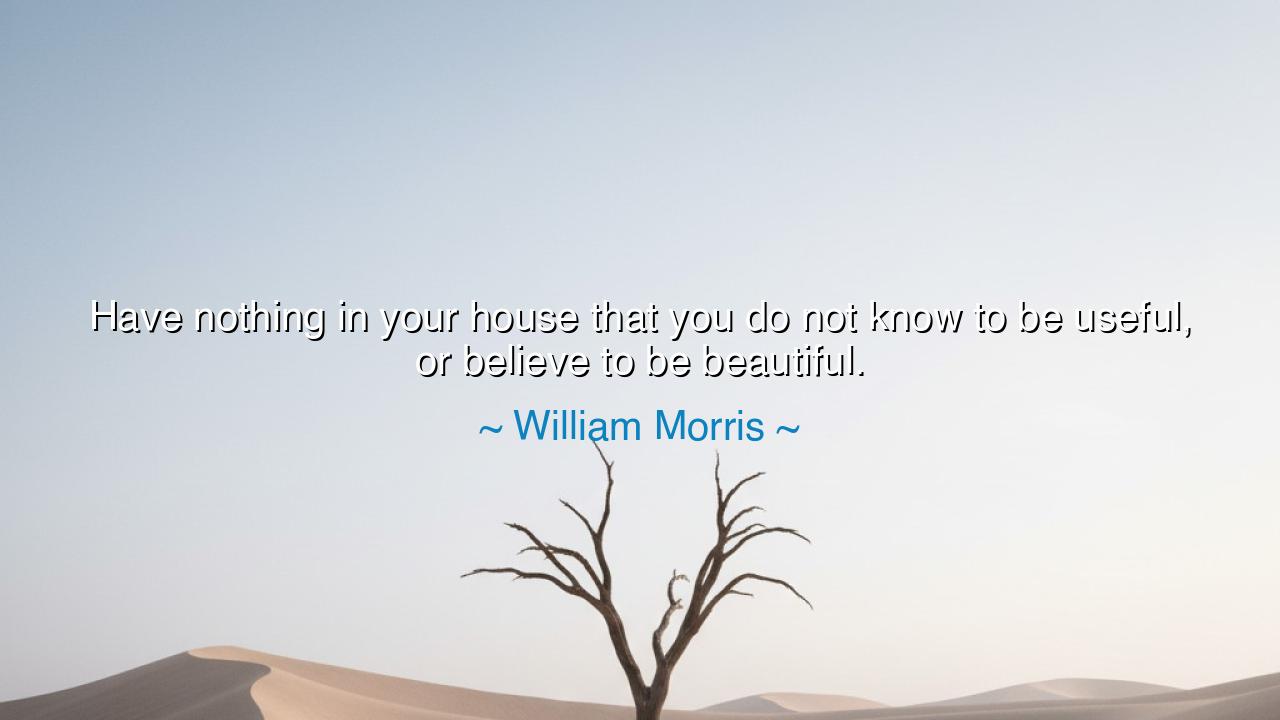
Have nothing in your house that you do not know to be useful, or
Have nothing in your house that you do not know to be useful, or believe to be beautiful.






“Have nothing in your house that you do not know to be useful, or believe to be beautiful.” Thus spoke William Morris, the craftsman, poet, and philosopher of the 19th century, whose words ring like the toll of a great bell in the halls of time. In this simple command lies a deep philosophy, a call not only for the ordering of our homes but for the ordering of our lives. For Morris saw what many have forgotten—that the spaces we dwell in are mirrors of our souls, and that simplicity, beauty, and purpose are the holy trinity of a life well-lived.
The origin of this saying arises from the heart of the Arts and Crafts Movement, of which Morris was both founder and prophet. In an age of machines and mass production, when the world was drowning in objects made without care and homes filled with clutter born of greed, he raised his voice like a prophet among merchants. “Return,” he urged, “to the wisdom of the hand and the purity of the heart.” To Morris, a chair was not just a chair—it was a piece of the world’s soul shaped into form. A spoon, a curtain, a wall—each should carry meaning, honesty, and grace. To fill one’s home with things unworthy of spirit was to pollute the sanctity of daily life.
In his words, Morris did not merely speak of decoration; he spoke of truth. For what we surround ourselves with shapes our hearts. The home that is crowded with objects of vanity and waste becomes heavy with restlessness. But the home that holds only what is useful and beautiful—tools that serve and forms that uplift—becomes a temple of peace. Such a space allows the mind to breathe, the heart to rest, and the spirit to rise toward higher things. To live among beauty is to remember that life itself can be art; to live with utility is to honor the quiet dignity of purpose.
There is an ancient story of a Japanese craftsman who spent his life perfecting the art of the tea bowl. His bowls were simple, imperfect, their surfaces cracked and uneven. Yet when he died, emperors wept to own them. Why? Because every curve, every flaw, bore the spirit of care, the devotion of a soul who refused to make what was untrue. His work embodied what Morris taught centuries later: that the things we keep must not merely fill space, but speak to the spirit. The bowl, though humble, was both useful and beautiful, and thus sacred.
The wisdom of Morris extends beyond our dwellings and into the very structure of our lives. He might well have said: “Have nothing in your mind that is not true, or in your heart that is not kind.” For just as our homes can be cluttered with meaningless possessions, so our hearts can be cluttered with needless desires, and our minds with empty noise. To live according to Morris’s teaching is to practice discernment—to ask, in all things, “Does this serve my soul? Does this lift my spirit?” In this way, life itself becomes artful, deliberate, and radiant with purpose.
Consider the example of Henry David Thoreau, who withdrew to Walden Pond to live with only what was essential. “Simplicity, simplicity, simplicity,” he cried. Like Morris, he understood that abundance without meaning is poverty in disguise. Surrounded by too much, we forget what truly matters; we become servants to our own possessions. To pare down, to choose only what is useful or beautiful, is not to live with less—it is to live with more of what is real.
The lesson for us is both ancient and urgent: clear your home, your mind, your heart. Keep only what serves the good, and what stirs the soul. Let the tools of your labor be honest; let the beauty you cherish reflect truth, not vanity. When you hold an object in your hand, ask yourself—does it serve a purpose, or does it awaken joy? If not, let it go. For every possession carries a piece of your spirit; give it only to what is worthy.
Thus, William Morris’s command is not about houses, but about harmony. When your surroundings reflect your highest values, peace will dwell with you. When beauty and usefulness reign together, the noise of excess fades, and the song of life grows clear once more. So, O seeker of simplicity, remember: have nothing in your house that you do not know to be useful, or believe to be beautiful—and in doing so, you will build not just a home, but a sanctuary for the soul.






AAdministratorAdministrator
Welcome, honored guests. Please leave a comment, we will respond soon